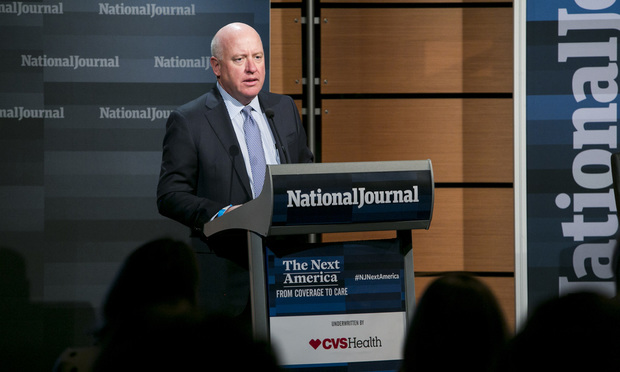Juggling Responsibilities to Improve Business: A Q&A With CVS General Counsel Thomas Moriarty
Moriarty says his in-house experience at Merck has helped him prepare CVS's acquisition of Aetna Inc.
October 09, 2019 at 02:44 PM
5 minute read
 Thomas M. Moriarty, Executive Vice President, Chief Policy and External Affairs Officer, and General Counsel, CVS Health. Photo: Kristoffer Tripplaar
Thomas M. Moriarty, Executive Vice President, Chief Policy and External Affairs Officer, and General Counsel, CVS Health. Photo: Kristoffer Tripplaar
Thomas Moriarty, the executive vice president, chief policy and external affairs officer, general counsel of CVS, has always been ambitious and has jumped at the opportunity to take on responsibility outside of the legal department.
Moriarty worked in-house at Merck & Co. and helped the company spin off Medco Health Solutions Inc. He joined CVS in 2012 and now oversees a legal department comprised of 265 attorneys.
Moriarty said the additional roles he's held has helped him prepare the company's acquisition of Aetna Inc. He spoke to Corporate Counsel on Wednesday about his time at CVS and his responsibilities outside of the legal department help to inform business and legal decisions.
This conversation has been edited for length and clarity.
Corporate Counsel: When you came to CVS in 2012, were you prepared to have responsibilities outside of the legal department?
Thomas Moriarty: Absolutely. At Medco, I was the head of our pharma group. I ran strategy. I ran M&A and corporate strategy.
The first year and a half or so at CVS was learning the business. I knew pharmacy and I knew PBM [pharmacy business management]. Retail, however, was a new animal. Also, the breadth and scale of CVS is different than a lot of other companies. In relatively short order, the role [of general counsel] did start to expand as it had not in some prior roles. It has been an evolution in the past five to seven years.
CC: What are some of your other duties outside of the general counsel role at CVS?
TM: I've always kept the general counsel hat on. My role initially expanded to taking over government affairs and the public policy function. Shortly after that, corporate strategy was added to the role. I was the chief strategy officer for approximately three years. The chief strategy officer role was really blending all that was involved with public policy-related issues, government affairs-related issues and where regulation was moving. How is that going to influence where we go as a business? That is very much related to how you form your strategy.
One of the major things we did in that window, aside from one or two acquisitions, was the formation of Red Oak Sourcing. Red Oak Sourcing was a venture we did with Cardinal Health. It is the largest generic sourcing operation in the United States. It covers all of the generic product needs for CVS Health. I served as chairman of the board of that for the first several years.
Shortly after that, I took on additional responsibilities heading up what was analogous to the global pharma strategy group I had at Medco.
In 2017, as we [CVS] aligned on the strategy of where we were going to go over the next several years, I gave up the corporate strategy role and the pharma role and took on all of the external affairs elements for the company. That meant all of the communications and a much more rigorous focus on policy and government affairs.
It really was a precursor to setting the framework for the acquisition of Aetna and all that would be involved with that. In looking at undertaking what is now the largest health care transaction ever, laying the groundwork for that was critically important for the success of that transaction.
CC: When you first went in-house, would you have expected to take up all of those roles in addition to working as a lawyer?
TM: When I first joined Merck, I wore both the legal and the policy hats. I was the representative to the trade association for the division that I was representing; which at that point, was the animal health group. So very early on I was getting that coordination of what's happening in legislation, what's happening in regulation and what's happening legally. You have to look at all of those together because they influence where a company can go.
CC: Do you one day hope to become a chairman of a board again or become a CEO someday?
TM: I've been lucky in the sense that I've been able to have both legal and business roles. It helps you as a general counsel to do that [have business responsibility] because you see the issues from both sides of the table. That is invaluable in terms of how you approach things.
The legal experience is very beneficial as you approach business issues because you need to be very much aware of the framework and fabric of how the legal system and all of that comes together. You also shouldn't be afraid of it. The better you're able to navigate that the more successful you'll be.
This content has been archived. It is available through our partners, LexisNexis® and Bloomberg Law.
To view this content, please continue to their sites.
Not a Lexis Subscriber?
Subscribe Now
Not a Bloomberg Law Subscriber?
Subscribe Now
NOT FOR REPRINT
© 2025 ALM Global, LLC, All Rights Reserved. Request academic re-use from www.copyright.com. All other uses, submit a request to [email protected]. For more information visit Asset & Logo Licensing.
You Might Like
View All
Private Equity-Backed Medical Imaging Chain Hires CLO, Continuing C-Suite Makeover

NLRB Blisters Skilled Care Home Chain That Terminated Nursing Assistant Who Complained About Wages
6 minute read
'Be Comfortable Being Uncomfortable': Pearls of Wisdom From 2024 GC Q&As

Baker Botts' Biopharma Client Sues Former In-House Attorney, Others Alleging Extortion Scheme
Trending Stories
Who Got The Work
J. Brugh Lower of Gibbons has entered an appearance for industrial equipment supplier Devco Corporation in a pending trademark infringement lawsuit. The suit, accusing the defendant of selling knock-off Graco products, was filed Dec. 18 in New Jersey District Court by Rivkin Radler on behalf of Graco Inc. and Graco Minnesota. The case, assigned to U.S. District Judge Zahid N. Quraishi, is 3:24-cv-11294, Graco Inc. et al v. Devco Corporation.
Who Got The Work
Rebecca Maller-Stein and Kent A. Yalowitz of Arnold & Porter Kaye Scholer have entered their appearances for Hanaco Venture Capital and its executives, Lior Prosor and David Frankel, in a pending securities lawsuit. The action, filed on Dec. 24 in New York Southern District Court by Zell, Aron & Co. on behalf of Goldeneye Advisors, accuses the defendants of negligently and fraudulently managing the plaintiff's $1 million investment. The case, assigned to U.S. District Judge Vernon S. Broderick, is 1:24-cv-09918, Goldeneye Advisors, LLC v. Hanaco Venture Capital, Ltd. et al.
Who Got The Work
Attorneys from A&O Shearman has stepped in as defense counsel for Toronto-Dominion Bank and other defendants in a pending securities class action. The suit, filed Dec. 11 in New York Southern District Court by Bleichmar Fonti & Auld, accuses the defendants of concealing the bank's 'pervasive' deficiencies in regards to its compliance with the Bank Secrecy Act and the quality of its anti-money laundering controls. The case, assigned to U.S. District Judge Arun Subramanian, is 1:24-cv-09445, Gonzalez v. The Toronto-Dominion Bank et al.
Who Got The Work
Crown Castle International, a Pennsylvania company providing shared communications infrastructure, has turned to Luke D. Wolf of Gordon Rees Scully Mansukhani to fend off a pending breach-of-contract lawsuit. The court action, filed Nov. 25 in Michigan Eastern District Court by Hooper Hathaway PC on behalf of The Town Residences LLC, accuses Crown Castle of failing to transfer approximately $30,000 in utility payments from T-Mobile in breach of a roof-top lease and assignment agreement. The case, assigned to U.S. District Judge Susan K. Declercq, is 2:24-cv-13131, The Town Residences LLC v. T-Mobile US, Inc. et al.
Who Got The Work
Wilfred P. Coronato and Daniel M. Schwartz of McCarter & English have stepped in as defense counsel to Electrolux Home Products Inc. in a pending product liability lawsuit. The court action, filed Nov. 26 in New York Eastern District Court by Poulos Lopiccolo PC and Nagel Rice LLP on behalf of David Stern, alleges that the defendant's refrigerators’ drawers and shelving repeatedly break and fall apart within months after purchase. The case, assigned to U.S. District Judge Joan M. Azrack, is 2:24-cv-08204, Stern v. Electrolux Home Products, Inc.
Featured Firms
Law Offices of Gary Martin Hays & Associates, P.C.
(470) 294-1674
Law Offices of Mark E. Salomone
(857) 444-6468
Smith & Hassler
(713) 739-1250






